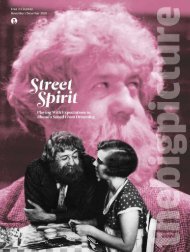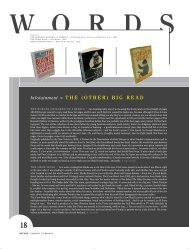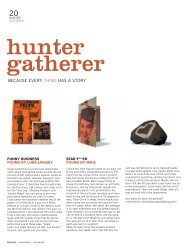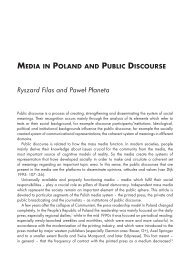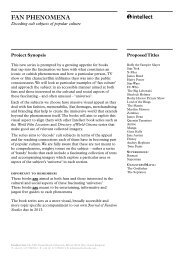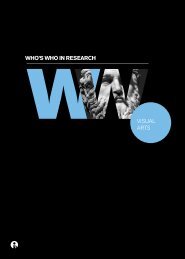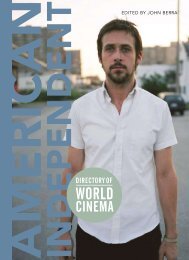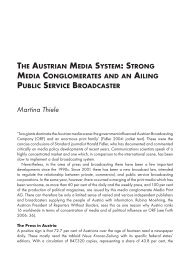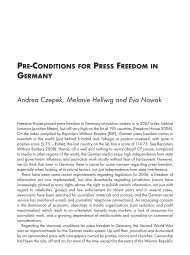Anthem - Intellect
Anthem - Intellect
Anthem - Intellect
You also want an ePaper? Increase the reach of your titles
YUMPU automatically turns print PDFs into web optimized ePapers that Google loves.
Signifying Europe<br />
‘feel like going away / when there’s no more sunshine in the house’. This celebration of<br />
holiday trips first stays within Europe’s borders, mentioning Amsterdam, Copenhagen,<br />
Capri, London and Paris as destinations. However, there is then an allusion to the<br />
globally connecting force of US music culture: ‘We’re European girls / and the things<br />
we love / we find them here, from London to Paris / even if the music is connected / live<br />
from Radio L.A.’ Yes, ‘We like the old continent / with background music USA’, and to<br />
the global outlook is then also added images of ‘Indian summer’ and ‘African sunsets’.<br />
In fact, there is an increasing ambiguity opening up a rift in the initial Eurocentrism,<br />
when at the end the words ‘The weather is nice in California / but Saint-Tropez is also<br />
good’ seem to place Europe as the second best. The song describes Europe as a united<br />
but diverse site of pleasure, and compares it as an old continent with the youthful<br />
United States as a given centre of the modern universe.<br />
These two songs thus propose popular music, television media and tourism as<br />
uniting tools. This unification still only included the good ‘old’ western half of the<br />
continent. It was no mere coincidence that it was in Zagreb, Slovenia 1990, the year<br />
after the breakdown of the Communist Bloc, that no less than the two most successful<br />
tunes explicitly thematised European fraternity. It was evidently a moment where good<br />
music makers, artists and producers agreed with the wide audience that the European<br />
project had a renewed urgency. Still none of these two tunes explicitly widened the<br />
concept of Europe to include also the part that had for so long been confined behind<br />
the iron curtain.<br />
On a joint second position (with equal votes as France) was Ireland’s Liam Reilly<br />
with his own ‘Somewhere in Europe’. Singing from his grand piano, dressed in shirt<br />
and tie but a loose brown jacket and trousers, and backed by two female singers,<br />
Reilly sang as an ‘I’ to a ‘you’ about having been separated but wanting to reunite: ‘We<br />
should be together, and maybe we just might / if you could only meet me somewhere<br />
in Europe tonight.’ The text mentions a wide range of European destinations—Paris,<br />
Rome, Amsterdam, German Black Forest, the Adriatic Sea and Seville—all of which<br />
are firmly located in the old, western part of Europe, and again focuses on tourist<br />
destinations and leisure-time practices. Such nostalgia for happy memories of lazy<br />
nightlife may be interpreted as a conservative lament for old Europe’s lost innocence,<br />
rather than a celebration of the recent developments.<br />
Italy won that same year of 1990 with Toto Cotugno’s own composition ‘Insieme<br />
1992’. It was characteristic that this year the old West European nations favoured<br />
Ireland while Italy got more high points from the comparably few East European<br />
countries that had at that time entered the competition. Cotugno was a popular singer,<br />
performing here in all white, in front of five mixed-gender backup vocals. The song<br />
has a typical Italian pop sensibility, with melody hooks that are easy to remember and<br />
sing, and the song builds up an increasing pressure as it rolls along; a real popular hit<br />
with a symphonic sound on a steady walking beat. ‘Insieme’ means ‘together’, and the<br />
190



